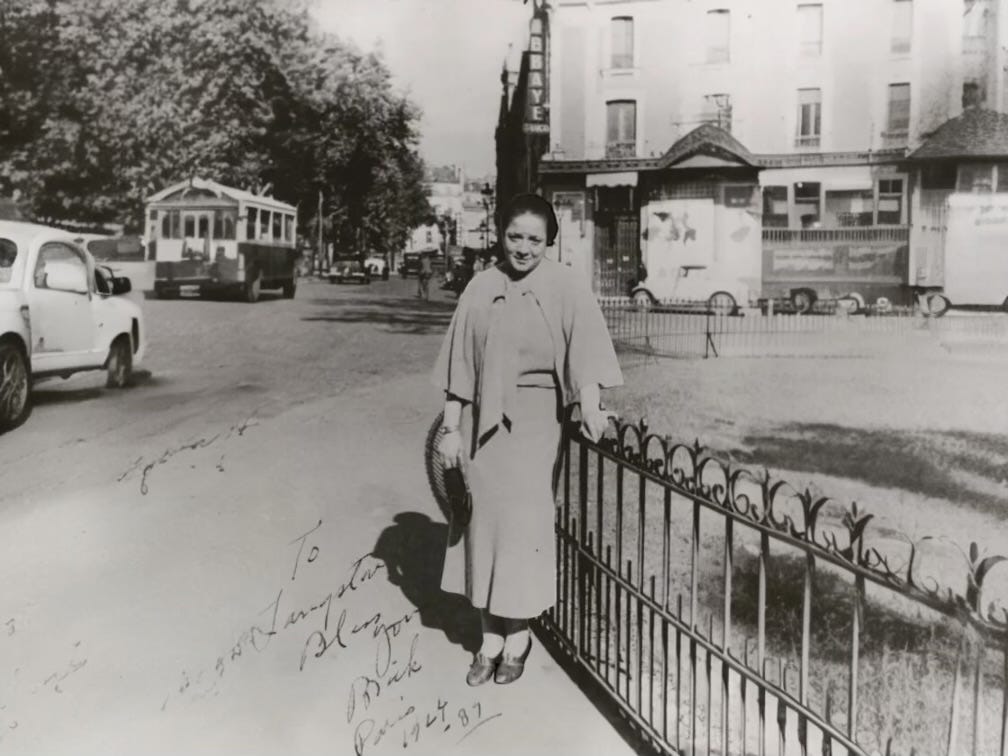Ada “Bricktop” Smith was not just a nightclub owner or entertainer—she was a cultural architect who shaped the global arts scene and defied racial barriers during some of the most tumultuous times in history.
Born on August 14, 1894, in Alderson, West Virginia, her story spans continents and decades, embodying resilience, talent, and an unrelenting commitment to artistry. With her distinctive red hair and freckles, a gift from her Irish grandfather, Bricktop’s presence was as striking as her contributions to Black history and cultural evolution.
Early Life and the Path to Entertainment
Born into the post-Civil War era, Bricktop’s childhood reflected the challenges of a nation grappling with the aftermath of slavery and systemic racism. Her father, a Black man, died when she was young, leaving her mixed-race mother, who had been born into slavery, to raise the family.
In search of better opportunities, the family relocated to Chicago—a city teeming with life, music, and a burgeoning cultural scene.
In the Windy City, Bricktop was captivated by the saloon culture on the South Side, which would come to define her career. By age five, she was performing in a production of Uncle Tom’s Cabin at Chicago’s Haymarket Theatre, igniting her love for performance.
The city’s thriving jazz and ragtime scene deeply influenced her artistic sensibilities, and its vibrant cultural diversity allowed her to develop her unique charisma and performance style.
At just 16, Bricktop joined the vaudeville circuit, touring with the Theatre Owners’ Booking Association (T.O.B.A.) and the Pantages vaudeville circuit. These experiences not only honed her craft but also introduced her to the harsh realities of racial discrimination on the road.
Her ability to command a stage, however, set her apart. While touring, she crossed paths with influential figures like heavyweight boxing champion Jack Johnson, who offered her a position at his Chicago club, Café de Champion.
These early opportunities gave her a critical understanding of nightlife management and performance dynamics, skills that would later serve her well on the world stage.
Paris and the Jazz Age: A Star Ascends
In 1924, at the age of 30, Bricktop made a pivotal decision to leave the United States for Paris. The move was driven by a desire to escape America’s pervasive racial tensions and to find a more accepting environment where her artistry could flourish.
Paris, during the Jazz Age, was a beacon for Black American expatriates seeking creative freedom and respite from segregation.
Bricktop quickly became a fixture in Parisian nightlife, performing at iconic venues like Le Grand Duc, where she met Langston Hughes, then working as a busboy.
Her distinctive style and charm caught the attention of Cole Porter, who became a close friend and would later write songs inspired by her. Porter once famously said that he “would rather write songs for Bricktop than anybody else.”
In 1929, Bricktop opened her legendary nightclub, Chez Bricktop. Situated in the heart of Paris, the club became a cultural hub where boundaries of race, class, and nationality dissolved. Among its illustrious clientele were F. Scott Fitzgerald, Ernest Hemingway, Josephine Baker, and royalty such as the Duke and Duchess of Windsor.
Chez Bricktop wasn’t just a nightclub; it was a salon for artistic exchange, an epicenter of creativity where Black American culture was celebrated on an international stage.
Breaking Barriers and Shaping Culture
Bricktop’s significance goes beyond her role as a nightclub owner. She became a mentor to numerous performers, including the legendary Mabel Mercer and Josephine Baker, both of whom credited her with helping to launch their careers.
She used her platform to promote Black artists, providing them with a space to showcase their talents to an elite and international audience. Her clubs were also places where integration thrived—something nearly impossible in the segregated United States of the time.
Her influence extended into the broader cultural fabric of the Harlem Renaissance. While she was physically in Paris, Bricktop’s work helped export the artistic revolution of Harlem to Europe, bridging continents and fostering a global appreciation for African American creativity. In doing so, she challenged racial stereotypes and redefined perceptions of Black excellence on the world stage.
World War II and a New Chapter
The outbreak of World War II forced Bricktop to close her Parisian club and flee to Mexico City. Undeterred, she opened another nightclub in 1944, proving her resilience and adaptability.
Her venue in Mexico City mirrored the success of Chez Bricktop, attracting a mix of celebrities and locals who were drawn to her magnetic personality and the inclusive atmosphere she cultivated.
In 1949, Bricktop returned to Europe and established the Roman Chez Bricktop in Rome. Like its Parisian predecessor, the club became a cultural hotspot, frequented by celebrities, artists, and political figures. Her ability to create spaces that transcended societal divisions made her clubs timeless and unique.
A Legacy Intertwined with Civil Rights
Throughout her career, Bricktop maintained close ties to the civil rights movement. In 1964, she hosted Martin Luther King Jr. during his visit to Rome, a testament to her enduring commitment to racial equality.
Her life and work served as a powerful counter-narrative to the systemic racism of her time, proving that Black talent and artistry could thrive on the global stage despite societal limitations.
Books Chronicling Her Life
Bricktop’s extraordinary life has been documented in several works, each shedding light on different facets of her journey.
Her autobiography, “Bricktop” written with James Haskins, offers an intimate look at her experiences and the cultural landscapes she helped shape.
But arguably the most illuminating book written about her life journey is entitled “Bricktop’s Paris,” a vibrant and deeply compelling exploration of the Black American women who found creative freedom and cultural significance in Paris during the interwar years.
The book focuses on the pivotal figure of Ada “Bricktop” Smith, whose legendary nightclub, Chez Bricktop, became a symbol of artistic liberation and racial integration.
Through meticulous research and evocative prose, the author paints a portrait of a community of Black expatriates—writers, dancers, musicians, and intellectuals—who sought refuge from the racial oppression of the United States in a city that embraced their talents.
By placing Bricktop at the center of this cultural renaissance, the book illuminates her role not just as an entertainer but as a connector, mentor, and cultural ambassador whose influence extended far beyond the walls of her club.
The text weaves Bricktop’s personal story with the larger historical forces at play, offering an incisive look at how Black American women in Paris negotiated race, gender, and art during a transformative era.
What makes Bricktop’s Paris particularly provocative is its nuanced examination of the contradictions inherent in the expatriate experience. While Paris offered freedoms unavailable in America, the book does not shy away from addressing the persistent challenges of being a Black woman in a predominantly white and male-dominated expatriate circle.
The narrative complicates the romanticized notion of Paris as a racial utopia by revealing the subtler dynamics of marginalization and exclusion, even within spaces of apparent inclusivity. By highlighting the agency and resilience of figures like Bricktop, Josephine Baker, and others, the book not only celebrates their contributions but also critiques the systemic forces that necessitated their migration.
In doing so, Bricktop’s Paris becomes more than a history—it is a meditation on the intersections of race, art, and identity, and a powerful reminder of the enduring struggle for creative and personal liberation. This book is essential reading for anyone seeking to understand the profound yet often overlooked contributions of Black American women to the global cultural landscape.
A Lasting Impact on Black History and Global Culture
Bricktop’s contributions to Black history and global culture are profound. As an Black American woman who achieved international acclaim during an era of pervasive racial discrimination, she shattered countless barriers.
Her ability to cultivate spaces of integration and artistic freedom laid the groundwork for future generations of performers and cultural leaders.
Moreover, Bricktop’s story reflects the broader narrative of African American expatriates who found liberation and creative freedom abroad. Figures like James Baldwin, Josephine Baker, and Richard Wright followed similar paths, but Bricktop’s unique role as both performer and impresario sets her apart.
Her success in Europe highlighted the stark contrast between the racial climate of the United States and the relatively more inclusive society she found overseas.
The Enduring Legacy of Bricktop
Ada “Bricktop” Smith’s life is a testament to resilience, creativity, and the power of art to transcend boundaries. From her early days in Chicago’s South Side saloons to her reign as the queen of Jazz Age Paris and beyond, she consistently broke barriers and elevated Black artistry on a global stage.
Her story is one of triumph over adversity, a narrative of a woman who used her talents to create spaces where others could thrive.
Bricktop’s legacy is not just one of entertainment; it is one of cultural diplomacy, social progress, and artistic excellence. She reminds us that creativity has the power to break down walls and build bridges, even in the face of seemingly insurmountable odds. For this, she remains an enduring symbol of Black excellence and a pioneer whose influence continues to resonate.
We Invite You to Join “Black Books + Black Minds.”
As a supporting member of "Black Books, Black Minds," you'll provide much needed resources for me to continue to dive deeper into a world where your reading passions around Black History thrive.
For just $6 a month or $60 a year, you unlock exclusive access to a close-knit community eager to explore groundbreaking authors and books.
So join us today. Your participation and support are welcomed and appreciated.







I'm ordering a copy of this book! What an interesting woman, thanks for the introduction.
So many stories like hers that we don't know. Thanks for bringing this one to our attention.